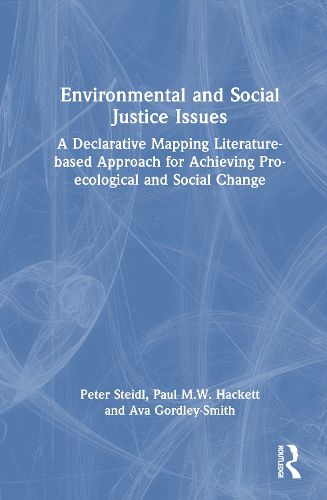Readings Newsletter
Become a Readings Member to make your shopping experience even easier.
Sign in or sign up for free!
You’re not far away from qualifying for FREE standard shipping within Australia
You’ve qualified for FREE standard shipping within Australia
The cart is loading…






This book uses a declarative mapping methodology to examine a range of issues relating to environmental and social justice issues, including climate change, homelessness, refugees, food insecurity, and racial and gender inequality. The book explores how we can bring about change in order to have a meaningful impact on these problems, using a literature-based approach to identify and analyse this through the Declarative Mapping Method, showing how this methodology can be used in the context of these issues. The authors build a body of knowledge based upon published research, to offer a template that may be used to bring about meaningful and appropriate changes in human behaviour in a variety of social/ecological justice contexts. In a world where most of the global challenges we face are a result of human behaviour, the book applies psychological principles to gain a deeper understanding of our responses to world issues. Case studies are included to show how specific strategies can be used to address problems, and a holistic perspective offers strategies and insights into addressing these challenges. This is an ideal text for researchers and students interested in environmental and social issues, especially those looking to find ways to address them through research methodologies.
$9.00 standard shipping within Australia
FREE standard shipping within Australia for orders over $100.00
Express & International shipping calculated at checkout
This book uses a declarative mapping methodology to examine a range of issues relating to environmental and social justice issues, including climate change, homelessness, refugees, food insecurity, and racial and gender inequality. The book explores how we can bring about change in order to have a meaningful impact on these problems, using a literature-based approach to identify and analyse this through the Declarative Mapping Method, showing how this methodology can be used in the context of these issues. The authors build a body of knowledge based upon published research, to offer a template that may be used to bring about meaningful and appropriate changes in human behaviour in a variety of social/ecological justice contexts. In a world where most of the global challenges we face are a result of human behaviour, the book applies psychological principles to gain a deeper understanding of our responses to world issues. Case studies are included to show how specific strategies can be used to address problems, and a holistic perspective offers strategies and insights into addressing these challenges. This is an ideal text for researchers and students interested in environmental and social issues, especially those looking to find ways to address them through research methodologies.